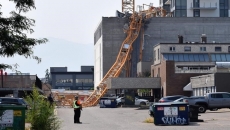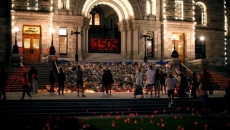The federal government has added fully vaccinated foreign nationals to the ranks of travellers who are once again welcome on Canadian soil.
As of midnight Monday night, quarantine requirements were eased for non-essential international travellers who have had a full course of a Health Canada-approved COVID-19 vaccine.
To be eligible, travellers must have allowed at least 14 days to pass since their last vaccine shot and show proof of a negative molecular test for COVID-19 that's no more than 72 hours old.
They are also required to use the ArriveCAN app or online web portal to upload their vaccination details.
Denis Vinette, vice-president of the travellers branch of the Canada Border Services Agency, says the latest wave of vaccinated visitors is arriving primarily by air.
Vinette says that simplifies matters for the agency, since airlines will be screening travellers to ensure they meet the criteria.
"The great thing in air is that you've got the airline working with you, who will not allow individuals to get on if they're not meeting all of the requirements," Vinette said in an interview. "The land border is a different beast."
Canada has approved four COVID-19 vaccines: Pfizer-BioNTech, Moderna, the Oxford-AstraZeneca shot, also known as Covishield, and the single-dose Johnson & Johnson option.
Vinette said the agency will continue to conduct random tests of travellers at the border, a surveillance program that has been in place since the phased-in process of easing travel restrictions began earlier this summer.
Between Aug. 9 and 26, the positivity rate for randomly selected, fully vaccinated travellers was just 0.19 per cent despite the increase in cases in both Canada and the U.S.
"While cases are currently increasing in Canada, the illness severity and hospitalization rates remain manageable as Canada's vaccination rates continue to rise," the agency said in a release last week.
"This data, along with continued adherence to public health measures by Canadians and incoming travellers, means that Canada is better able to prevent outbreaks of infection and can now allow more incoming fully vaccinated travellers without increasing the risk to the health and safety of Canadians."
Direct flights from India and Morocco will remain suspended until at least later this month. Travellers from either country who take an indirect route to Canada will be required to produce a recent negative molecular test taken in a third country.
The U.S., meanwhile, continues to prohibit non-essential Canadian travellers from entering the country by land. Air and sea travellers are exempt, though passengers by rail, ferry and pleasure boat are not.
The U.S. has also maintained stringent travel limits on a number of foreign countries, including China, India, Ireland, Iran, South Africa, Brazil and the 26 European countries without border controls, known as the Schengen group.
The borders with Canada and Mexico, however, are widely seen as falling into a different category, in part because of the close trade ties between the three countries as well as the fact that visitors can arrive by land without the help of a private-sector company like an airline or cruise ship operator.
The continuing U.S. restrictions have provided the agency with a silver lining of sorts, however: since Canadians can't cross the border for short incidental trips or shopping excursions, that's meant fewer people trying to return to Canada than might otherwise be the case.
"In a normal year, throughout the summer, about 65 per cent of our border crossings are what we term day trippers," Vinette said.
"Currently, we only have unidirectional entry, and so you don't have day trippers from Canada going to the U.S. and then coming back, which is a significant portion of our usual traffic volumes."






